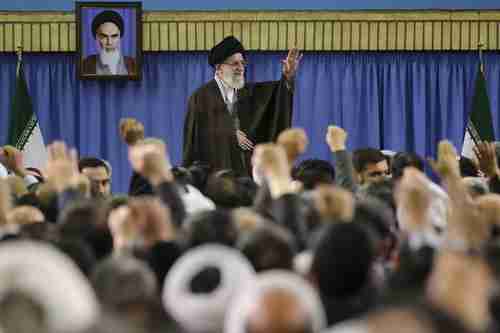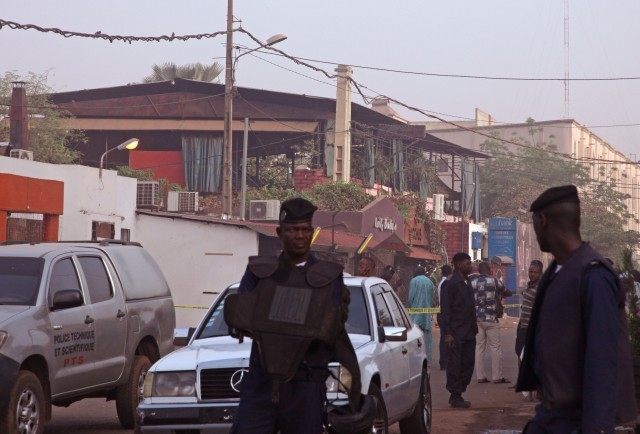This morning’s key headlines from GenerationalDynamics.com
- Iran’s Supreme Leader Khamenei makes public appearance on Sunday
- Mali’s capital city Bamako in shock after terror attack
- Are ISIS and Boko Haram ‘far right’ extremists?
Iran’s Supreme Leader Khamenei makes public appearance on Sunday

Khamenei in a meeting at his home in Tehran on Sunday (AP)
Three days ago I wrote “6-Mar-15 World View — Khamenei’s illness may signal generational policy change in Iran”, in which I referred to media reports that Iran’s 76 year old Supreme Leader Ayatollah Seyed Ali Khamenei has been hospitalized in critical condition with prostate cancer. I described significant policy changes in Iran that his death could trigger due to generational differences between the survivors of the 1979 Great Islamic Revolution and the generations that grew up after the revolution. Since then, the media reports have morphed into widespread rumors of Khamenei’s death.
However, Khamenei was well enough on Sunday to participate in a meeting in his home with environmental activists. The television pictures that aired made him look comfortable and healthy. So it looks like we’re going to have to wait a little longer for that policy change. The National (UAE)/AP
Mali’s capital city Bamako in shock after terror attack
Northern Mali has been bloodied repeatedly starting in 2012, with a separatist rebellion by the ethnic Tuaregs, which was overtaken by terrorist attacks by the al-Qaeda linked Ansar Dine, and then further attacks by Al-Qaeda in the Islamic Maghreb (AQIM). The Islamist attacks resulted in the destruction in Timbuktu of centuries-old shrines and mosques, along with tens of thousands of ancient manuscripts.
But through all of that, Mali’s capital city Bamako, in southern Mali, has escaped the chaos, until Saturday. Residents of Bamako were stunned to hear that a masked gunman sprayed bullets into La Terrasse restaurant and bar killing five people, including a Frenchman and a Belgian. The AQIM-linked terror group Al Mourabitoun (The Sentinels), led by Algerian terrorist Moktar Belmoktar, claimed responsibility, saying that it was “to avenge our prophet against the unbelieving West which has insulted and mocked him,” and in revenge for the killing of a leader of the Al Mourabitoun group in a French-Malian military operation.
In addition to five deaths, there were seven people injured, including two international experts working for the United Nations. No sooner did the UN put out a statement condemning the attack in Bamako, terrorists attacked a UN base in northern Mali with 30 rockets and shells targeting the base, killing one UN soldier and two civilian children.
As I have been describing for months, there is a large and growing Muslim versus Muslim war in the Mideast, North Africa and South Asia, and it seems to worsen in one way or another every week. This is a strong historical trend, and at some point it will pull us and the West into it. Irish Independent and United Nations and AFP
Are ISIS and Boko Haram ‘far right’ extremists?
Fawaz Gerges, London School of Economics, occasionally appears on news shows analyzing Mideast events. Appearing on al-Jazeera on Sunday, Gerges was asked to comment on Friday’s announcement by Boko Haram that it was pledging allegiance to the Islamic State (IS or ISIS or ISIL or Daesh).
The interview was interesting on a couple of levels. Gerges said that Boko Haram was so extremist, that al-Qaeda would not be interested, while ISIS has not been interested in the past, though may be changing its mind. The interview was also interesting for Gerges’s bizarre characterization of ISIS and Boko Haram as “far-right extremists.”
My transcription:
Ironically, in the last few months, ISIL has not really responded to the many messages by Boko Haram (BK) praising ISIL, and that tells me that even ISIL, one of the most extremist jihadist organizations, have viewed BK as a liability.
But my take now if you ask me if Abu Omar al-Baghdadi, the leader of ISIL, would accept the fealty of BK, I would say yes. Yes, because it’s a win-win.
It shows ISIL as the leader of the global jihadist movement, that jihadists near and far, in particular militant activists– whether you’re talking about Egypt or Yemen or Algeria or Afghanistan or Pakistan, and now Boko Haram– are basically praising and saying they want to be part of this winning horse. ISIL is being seen as a winning horse, as a powerful organization.
And even if ISIL accepts the allegiance or the fealty by BK, then little will change. Remember, BK is desperate for legitimization. It would like to be part of ISIL which is seen as a basically winning horse, but nothing would change on the ground.
But the reality is you’re talking about ISIL and BK, two sides of the same coin, really on the far right of the jihadist movement, and would argue that Ayman al-Zawarhiri, the leader of al-Qaeda central, would really hesitate to accept any kind of allegiance from BK, because BK is seen as ISIL is seen– as very extremist, very nihilistic, really on the far right of all militant organizations that exist today.
Gerges very clearly emphasized the phrase “far right,” even repeating it, and so we have to assume that Gerges wants to burnish his own far left credentials. Gerges holds the Emirates Chair in Contemporary Middle Eastern Studies at the London School of Economics and Political Science and in today’s society, political scientists are almost always far left.
But what makes it so bizarre is that “right” and “left,” as applied to politics, is a European concept, and it doesn’t really make any sense outside of Europe (and North America) because politics is so different in other regions. In the Mideast, if ISIS is “far right,” then who’s “far left”? Al-Qaeda? Hezbollah? Iran? It’s an almost meaningless question.
But it’s also bizarre for another reason. In the French Revolution, where the terms “left” and “right” were first applied to politics, the extremists perpetrating the Reign of Terror were on the left, while the politicians on the right opposed it. So it’s hard to see how ISIS and Boko Haram could be called “far right” in any conceivable sense.
I guess you can’t trust anyone these days (except me) not to put an ideological spin on something where it doesn’t even make sense.
KEYS: Generational Dynamics, Iran, Ayatollah Seyed Ali Khamenei, Mali, Bamako, La Terrasse, Al Mourabitoun, The Sentinels, Al-Qaeda on the Islamic Maghreb, AQIM, Moktar Belmoktar, Fawaz Gerges, Nigeria, Boko Haram, Islamic State / of Iraq and Syria/Sham/the Levant, IS, ISIS, ISIL, Daesh, French Revolution, Reign of Terror
Permanent web link to this article
Receive daily World View columns by e-mail

COMMENTS
Please let us know if you're having issues with commenting.